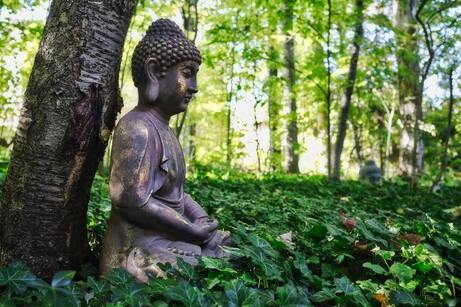Buddha’s life and teaching and thus the birth of Buddhism itself are deeply intertwined with nature. Many important events in the Buddha’s life took place in the natural forests of Northern India. It is said that the Buddha achieved enlightenment in Bodh Gaya under the Bodhi tree. This tree has become one of the most sacred symbols throughout the Buddhist world. Even today, natural surroundings are considered especially suitable for meditation practice.
|
All Buddhists live according to the Five Precepts. Within these guidelines about how to act properly, the first one states that Buddhists should abstain from taking any form of life. Instead, Buddhists should show compassion and loving kindness (metta) to all creatures. This compassionate empathy for all forms of life is the response to the acknowledgement of the universality of suffering. These ideas also appear in the "Four Immesurables" that often precede Buddhist rituals:
May all beings have happiness and the causes of happiness. May they all be free from suffering and the causes of suffering. May they never be separate from the sacred happiness untainted by suffering. May they abide in great impartiality, free from attachment to close ones and aversion to others. |
Buddhist monastics have to abide by even stricter rules regarding living beings. They should abstain from practices where living creatures could unintentionally be hurt. As a result, Buddhist monks and nuns retreat to their monasteries during the annual rainy season to avoid injuring worms and other insects that surface in wet weather as well as not destroying crops.
The understanding of karma and rebirth also influence how Buddhists treat the environment and animals. Kindness to animals is a source of merit, which makes enlightenment more possible and leads to a better rebirth. Kindness to animals includes the construction and protection of parks, ponds, wells and natural habitats.
The need to protect our common nature is also expressed by the 14th Dalai Lama, a famous Tibetan Buddhist teacher:
The understanding of karma and rebirth also influence how Buddhists treat the environment and animals. Kindness to animals is a source of merit, which makes enlightenment more possible and leads to a better rebirth. Kindness to animals includes the construction and protection of parks, ponds, wells and natural habitats.
The need to protect our common nature is also expressed by the 14th Dalai Lama, a famous Tibetan Buddhist teacher:
“Because we all share this small planet Earth,
we have to live in harmony and peace with each other and with nature.
That is not just a dream, but a necessity.”
we have to live in harmony and peace with each other and with nature.
That is not just a dream, but a necessity.”

